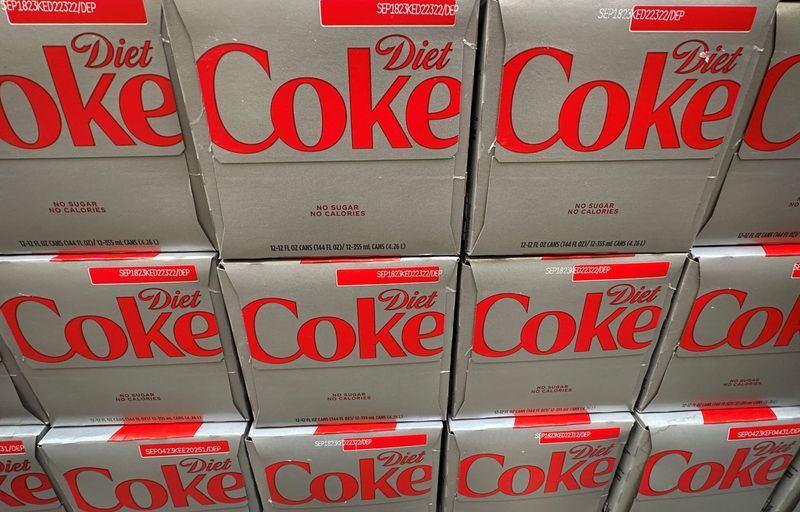(Reuters) - Aspartame, a popular artificial sweetener found in Diet Coke, chewing gum, yoghurt and other food products, is a "possible carcinogen" but it remains safe to consume at the existing daily intake guidelines, according to new rulings from two different World Health Organization-linked groups.
WHAT IS ASPARTAME?
Discovered in 1965 by American chemist James Schlatter, aspartame is about 200 times sweeter than regular table sugar. It was approved by the U.S. Food and Drug Administration in 1974 for use as a tabletop sweetener and as an additive in chewing gum, breakfast cereals and dry bases for foods.
WHAT ARE THE NEW RULINGS, AND WHO MADE THEM?
One group of experts, the International Agency for Research on Cancer (IARC), said aspartame is a "possible carcinogen". That means there is limited evidence showing a potential cancer link and puts it in the same classification group as aloe vera extract and some Asian pickled vegetables.
Another expert panel, the WHO/FAO Joint Committee on Food Additives (JECFA), also reviewed aspartame and maintained its advice that it remains safe to consume within current recommended daily limits. For aspartame, this limit is 40 milligrams of aspartame per kilogram of body weight per day.
That means an adult weighing 70 kg (approximately 150 pounds) would need to consume between 9 and 14 cans of diet soft drink in one day to surpass the limit.
WHAT DOES THIS MEAN?
There has been some confusion around the rulings, but the agencies say they are "complementary". The two groups work differently, and have a different aim: while IARC flags a potential hazard based on even limited evidence, JECFA assesses the real-life risk.
Gunter Kuhnle, professor of nutrition at the United Kingdom's University of Reading, said it highlighted the difference between hazard and risk.
"Sunlight is a hazard as it can cause cancer, but the risk depends on the amount of sunlight and whether we use protection. Likewise, even if aspartame causes cancer at very high amounts, there is no risk when consuming it at the amounts that are permitted in foods," he said.
WHY IS ASPARTAME POPULAR?
Because aspartame is very sweet, much less is needed in products to create the same taste as sugar, so it has a calorific value of almost zero. It also does not have the bitter aftertaste of saccharin, another sweetener. Aspartame grew in popularity as a more diet-conscious consumer emerged in the 1980s.
WHAT PRODUCTS CONTAIN ASPARTAME?
The low-calorie sugar substitute can be found in soft drinks, gelatin, confectionery, desserts, and sugar-free cough drops. It is also used to enhance flavoring of baked and canned foods, powdered drink mixes, candy and puddings.
Here is a list of popular items that contain aspartame:
Product Parent Company
Diet Coke Coca-Cola (NYSE:KO.N)
Extra sugarfree chewing gum Mars
Jell-O sugarfree gelatin dessert mix Kraft Heinz (NASDAQ:KHC.O)
Snapple zero sugar tea and juice Keurig Dr Pepper
drinks (NASDAQ:KDP.O)
Sugar Twin 2 sweetener packets B&G Foods (BGS.N)
Equal Zero Calorie Sweeteners Whole Earth Brands
(FREE.O)
Trident (LON:TRR) sugar-free peppermint gums Mondelez (NASDAQ:MDLZ) International
(MDLZ.O)/Perfetti Van
Melle
HAVE COMPANIES MOVED AWAY FROM ASPARTAME?
Aspartame's use in food products has been debated for decades and has also prompted some companies to remove the compound from their products.
PepsiCo (NASDAQ:PEP) removed aspartame from Diet Pepsi in 2015 but brought it back a year later. It remains an ingredient in Diet Pepsi.
General Mills' Yoplait also removed aspartame from its yoghurts in 2014. The brand's low-sugar products now contain alternative sweeteners like sucralose.
WHAT OTHER ARTIFICIAL SWEETENERS ARE IN USE?
Saccharin, sucralose and neotame are among the artificial sweeteners for which JECFA has recommendations.
The FDA has also authorized three types of plant- and fruit-based sweeteners, including extracts obtained from the stevia plant, swingle fruit extracts and a group of proteins called Thaumatin.
IS ASPARTAME USED WORLDWIDE?
More than 90 countries, including the United Kingdom, Spain, France, Italy, Denmark, Germany, Australia and New Zealand have reviewed aspartame and found it to be safe for human consumption and allow its use.
Source: WHO, IARC, JECFA, company websites, FDA, EFSA, National Library of Medicine
